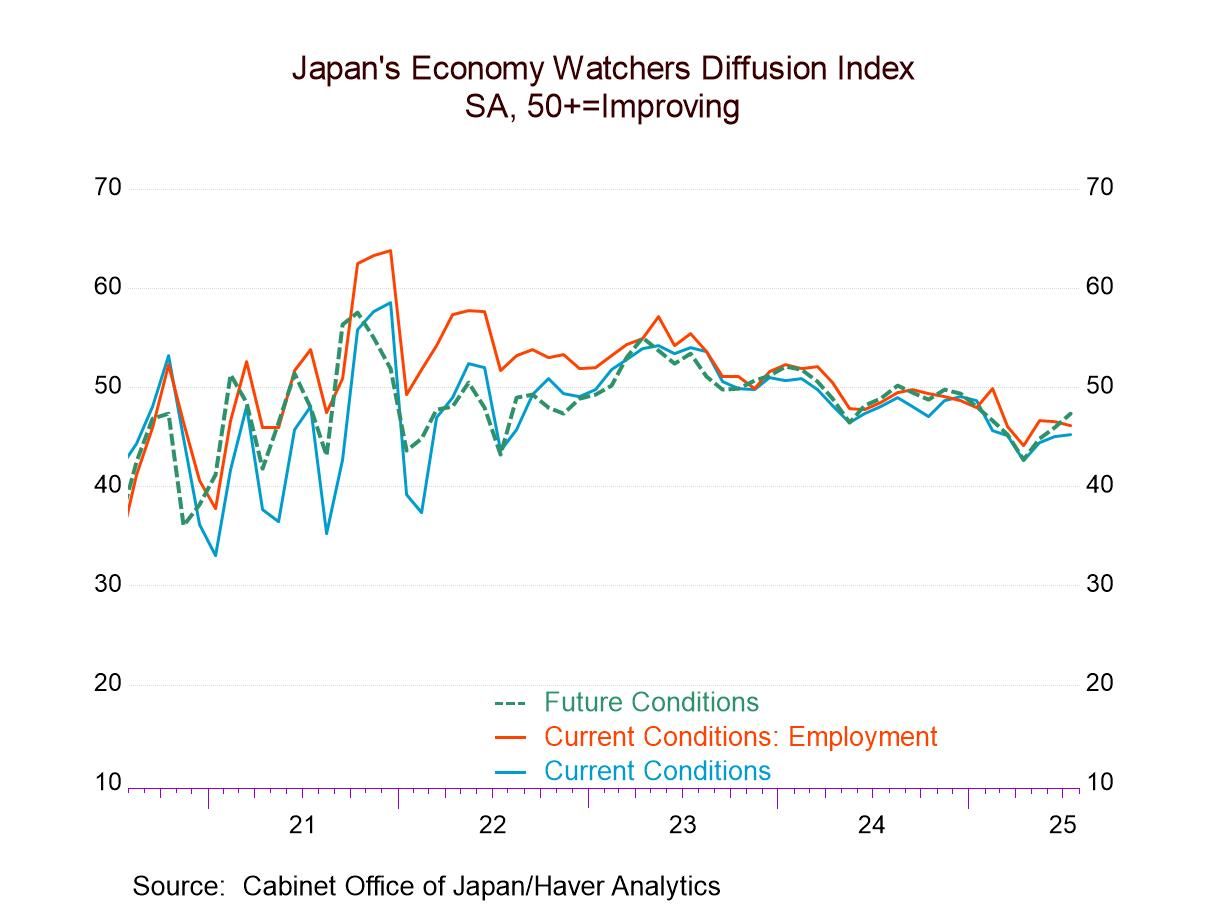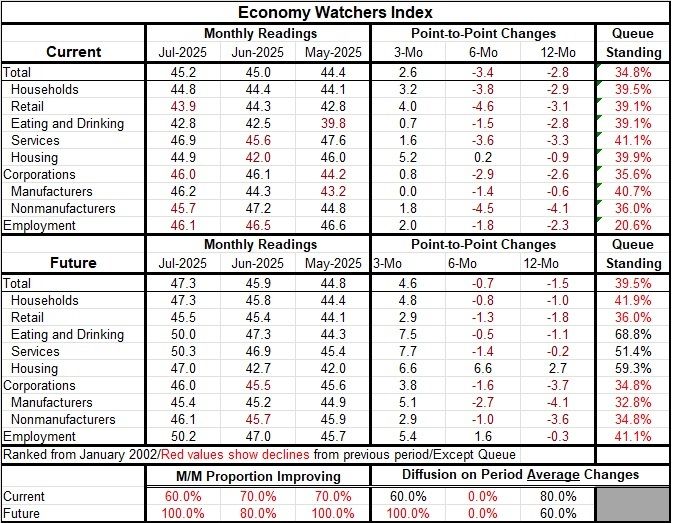Japan’s Economy Watchers Index Rebounds

Japan's economy watchers index is showing some rebound after a period of weakness. The economy is not breaking out into sharply improved readings; however, the monthly readings have now increased and improved for three months in a row for both the current and the future indexes. The increase for the current index over three months is 2.6 diffusion points; for the future index it's 4.6 diffusion points. Over 12 months, both readings are still lower on balance.
Percentile standings-rankings Both headline readings are still below their historic medians, but the current index has a 34.8 percentile standing and the future index has a 39.5 percentile standing. The headline queue standings in both cases are below 50%- a reading below 50% indicates a reading below its historic median.
Diffusion readings Current index components all have diffusion readings below their respective 50 marks, which tells us that they're all showing contraction. The surveys show a headline reading of 45.2 for the current index in July, compared to 47.3 for the future index in July. For the current index, all of the component rankings are below 50 for July, June and May. For the future index, there are three readings above 50 in July and none for June or May.
July’s Future Index improvement The improvement in July for the future index is concentrated in eating and drinking places, services, and employment – all are households or individual-linked readings. That may reflect some sense of relief that Japan’s tariff negotiations with the United States were progressing and finally a deal was struck. The future index, in addition to having several diffusion readings above 50 in July, shows three readings that have queue standings, above the 50th percentile, putting them above their historic medians. Those are readings for eating and drinking places, services, and for housing. The reading for housing takes on a 59.3 percentile queue standing even though its diffusion index remains below 50 at 47. In July it moved up to 47, making a relatively sharp gain from a reading of 42.7 in June.
There is, therefore, relatively more evidence of improvement going on in the future index compared to the current index where monthly gains were generally smaller.
The breadth of improvement Month-to-month the current index improved in 60% of the categories in July compared to 70% in May and June. The future index components improved across the board in July, 80% of them improved in June, and gains were across the board again in May. Looking at the changes over three months, six months, and 12 months according to average data, over three months 60% of the current categories improved compared to none over six months and 80% over 12 months. For average future data, 100% improve over three months, none improve over six months and 60% improve over 12 months.

Summing up The improvement in the most recent months is clear cut, whether it can be sustained is another matter. It likely reflects some release of anxiety over the tension created by the tariff negotiations with the United States; however, the Bank of Japan is still trying to corral inflation, and on the political side the LDP lost its upper house election and Japanese politics is being reorganized. As far as consumer confidence and expectations are concerned, we can expect that a lot is still in flux in Japan.
Robert Brusca
AuthorMore in Author Profile »Robert A. Brusca is Chief Economist of Fact and Opinion Economics, a consulting firm he founded in Manhattan. He has been an economist on Wall Street for over 25 years. He has visited central banking and large institutional clients in over 30 countries in his career as an economist. Mr. Brusca was a Divisional Research Chief at the Federal Reserve Bank of NY (Chief of the International Financial markets Division), a Fed Watcher at Irving Trust and Chief Economist at Nikko Securities International. He is widely quoted and appears in various media. Mr. Brusca holds an MA and Ph.D. in economics from Michigan State University and a BA in Economics from the University of Michigan. His research pursues his strong interests in non aligned policy economics as well as international economics. FAO Economics’ research targets investors to assist them in making better investment decisions in stocks, bonds and in a variety of international assets. The company does not manage money and has no conflicts in giving economic advice.
More Economy in Brief
 Global| Feb 05 2026
Global| Feb 05 2026Charts of the Week: Balanced Policy, Resilient Data and AI Narratives
by:Andrew Cates






